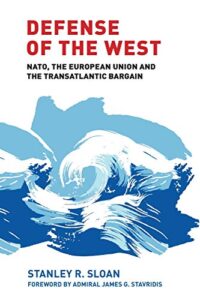 At a time of sharpening strategic competition between the democracies and resurgent authoritarians, are the principal axes of democratic solidarity in need of repair?
At a time of sharpening strategic competition between the democracies and resurgent authoritarians, are the principal axes of democratic solidarity in need of repair?
The specter of conflict is haunting Europe for the first time in decades, Poland’s President Andrzej Duda told the recent Lithuanian National Security Conference in Vilnius. He warned of the dangers of hybrid threats, saying that “illegal attacks on political and economic systems and on democratic values are aimed at disorganizing our societies.”
The United States and its allies and partners should step up their collective responses to Moscow’s cyberwarfare, election interference, and other actions that threaten the health of their political and economic systems, say CNAS analysts Michael Kofman and Andrea Kendall-Taylor. They should, for example, agree to take collective action against any foreign election interference that crosses agreed-on thresholds, they write for Foreign Affairs:
Russia’s digital ambitions may be overshadowed by China’s, yet Russia is developing its own brand of digital dictatorship, designed in part to undermine democracy worldwide. Addressing that threat also requires working with like-minded democratic partners in international organizations such as the International Telecommunication Union to ensure that it is not Beijing and Moscow that write the digital rules and norms of the future.
The transatlantic bridge – perhaps the most critical piece of the global security infrastructure – needs shoring up, prominent observer James Stavridis writes for Bloomberg.
A principal bastion of the transatlantic relationship, NATO is also being challenged by internal strains and external tensions.
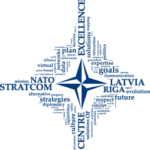 “NATO’s political role more closely resembles the pre-1989 period when it was a bulwark of democracy against an authoritarian challenger,” according to the November 2020 report of the NATO Reflection Group.
“NATO’s political role more closely resembles the pre-1989 period when it was a bulwark of democracy against an authoritarian challenger,” according to the November 2020 report of the NATO Reflection Group.
In his first visit to NATO HQ in Brussels, U.S. Secretary of State Antony Blinken insisted, “We have to hold one another [accountable] to the values at the heart of our alliances. … We all must speak up when countries backslide from democracy and human rights.”
His oblique reference was to NATO member states like Hungary, Poland and Turkey whose regression is damaging to the organization’s democratic integrity, threatening to enhance what some analysts call the “strategic cacophony” of an alliance whose members hold varying views of the threats it confronts.
In this context, democratic decline has empowered the leaders of some NATO states to take self-serving decisions at the expense of the alliance’s collective interests, according to CSIS analysts Rachel Ellehuus and Pierre Morcos. In both Turkey and Hungary, for example, hypernationalism and corrupt ties with Russia have led to decisions that have compromised NATO decision-making and weakened the alliance’s military readiness, they write for War On The Rocks:
- Turkey recently acquired a Russian S-400 missile system, for example, which can undermine NATO’s integrated air defense, and then launched an invasion of northeast Syria that endangered NATO countries’ forces on the ground.
- Turkey also blocked a defense plan for the Baltic states and Poland on the grounds that NATO did not sufficiently support its war against Kurdish separatist forces.
- Hungary has helped hamstring NATO, as well. In 2019, Budapest blocked Ukraine’s NATO Membership Action Plan and canceled meetings of the NATO-Ukraine Commission over a bilateral dispute regarding Kiev’s treatment of the country’s ethnically Hungarian minority.
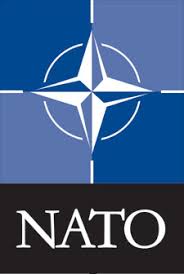 As the NATO Reflection Group, observed, “A shared democratic identity is what distinguishes the Alliance from the principal threats and challenges it faces,” and yet, it adds, “Inside NATO, societal divisions have arisen and representative democracy is being challenged. In many ways, the Alliance could be said to be formidable in military strength; but it is far from invulnerable to such political turbulence.”
As the NATO Reflection Group, observed, “A shared democratic identity is what distinguishes the Alliance from the principal threats and challenges it faces,” and yet, it adds, “Inside NATO, societal divisions have arisen and representative democracy is being challenged. In many ways, the Alliance could be said to be formidable in military strength; but it is far from invulnerable to such political turbulence.”
NATO should “draw a clear political and moral distinction between democracy and the autocratic forms of government that characterize NATO’s systemic rivals,” the group added.
Accordingly, NATO’s Parliamentary Assembly, recently accepted the Reflection Group’s recommendation and urged NATO Allies to establish a Centre for Democratic Resilience “dedicated to providing support to individual Allies, upon their request, for strengthening societal resilience to resist interference from hostile external actors in the functioning of their democratic institutions and processes.”
“What is it we’re an Alliance for? It is the promotion, empowerment, defense [and] advocacy for democracy, democratic institutions and governance. A free people exercising their free will. That’s what we are. That’s who we are,” Gerald E. Connolly (U.S.) told the Assembly.
Such a center would be “a furtherance of NATO’s purpose,” said Nancy Pelosi, Speaker of the US House of Representatives, and is “necessary because of autocracy raising its head and challenging democracy in many places, as well as the corruption that frequently goes with autocratic rule.”
For instance….
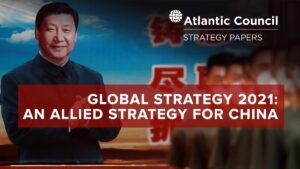 China is “best understood as a full-spectrum systemic rival,” said the NATO Reflection Group.
China is “best understood as a full-spectrum systemic rival,” said the NATO Reflection Group.
Yet NATO also appears conflicted over the nature – or even the existence – of the threat posed by Beijing.
“If anything, the rise of China makes NATO more needed, more important,” NATO Secretary General Jens Stoltenberg told the FT last week. Yet China “is not mentioned in one single word in NATO’s current strategic concept.”
“We strongly believe it’s necessary to engage with China. There are opportunities,” Stoltenberg said, while adding words of caution.
“You have seen the way they have treated Canada, Australia and my own country, Norway, when the Norwegian Peace Prize committee awarded the Peace Prize to a Chinese dissident,” [and Lithuania, the FT added].
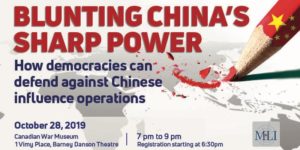 In a June summit statement, NATO allies branded China a security risk for the first time.
In a June summit statement, NATO allies branded China a security risk for the first time.
“China’s stated ambitions and assertive behavior present systemic challenges to the rules-based international order and to areas relevant to alliance security,” said NATO’s final communique.
“In the age of global competition Europe and North America must stand up against authoritarian regimes like Russia and China,“ said Stoltenberg. “China is coming closer to us. We see them in cyberspace, we see China in Africa, but we also see China investing heavily in our own critical infrastructure,” he added.

National Endowment for Democracy (NED)
“We’re not entering a new Cold War and China is not our adversary, not our enemy,” Stoltenberg insisted. Some member states, notably Germany, have openly resisted U.S. calls to treat Beijing as a strategic adversary.
Today’s leading autocracies – the PRC and Russia – have adopted different strategies for altering the international order, notes James Rogers, co-founder of the Council on Geostrategy. Both see the prevailing international order as antithetical to their interests and seek to dismantle it piece by piece. However, the CCP has developed a ‘counter-systemic’ strategy, whereas the Kremlin prefers an ‘anti-systemic’ drive. The former involves disaggregating the prevailing order and replacing it with a new one, while the latter involves simply dismantling the prevailing order.
Thus, a counter-systemic strategy can be likened to a true ‘great power’ strategy, while an anti-systemic drive is a poor man’s approach, he writes in a contribution to a report from the London-based Foreign Policy Centre and Westminster Foundation for Democracy (WFD) entitled: Global Britain for an open world?
 “Nothing will be more essential to our success than unity among like-minded democracies,” US Assistant Secretary of State for European and Eurasian Affairs, Karen Donfried told the recent NATO Parliamentary Assembly. “Democracies must show that they can deliver for their own people, and people everywhere, at this vital moment.”
“Nothing will be more essential to our success than unity among like-minded democracies,” US Assistant Secretary of State for European and Eurasian Affairs, Karen Donfried told the recent NATO Parliamentary Assembly. “Democracies must show that they can deliver for their own people, and people everywhere, at this vital moment.”
And that entails engaging like-minded democracies beyond the transatlantic arena, requiring a genuinely global democratic solidarity, observers suggest.
In recent years, antidemocratic trends have torn at the fabric of democracy in all corners of the globe, the National Endowment for Democracy adds. At the same time, authoritarian governments have become more assertive in pursuit of their interests. Recognizing the growing threats to the future of democracy, the Biden Administration has made democracy a cornerstone of its policy agenda and will host a Summit for Democracy to build greater global cooperation.
Please join the Center for European Policy Analysis, in collaboration with the National Endowment for Democracy and the Taipei Economic and Cultural Representative Office, as leading voices from the US, Europe, and Asia come together to discuss concrete ways in which democracies from the three regions can work together to strengthen their commitment to democracy as well as defend democratic norms and values across the globe.
 TOWARD A COMMON DEMOCRATIC AGENDA: VIEWS FROM THE US, ASIA, AND EUROPE
TOWARD A COMMON DEMOCRATIC AGENDA: VIEWS FROM THE US, ASIA, AND EUROPE
Speakers
Bi-khim Hsiao, Representative, Taipei Economic and Cultural Representative Office
Alina Polyakova, President and CEO, Center for European Policy Analysis
Maiko Ichihara, Associate Professor, Hitotsubashi University
H.E. Žygimantas Pavilionis, Chair, Committee on Foreign Affairs of the Lithuanian Parliament (Seimas)
Moderator
Carl Gershman, Former President, National Endowment for Democracy
This event is being held in partnership with the Center for European Policy Analysis (CEPA) and the Taipei Economic and Cultural Representative Office in the United States (TECRO). Click here to watch the event on October 27.







